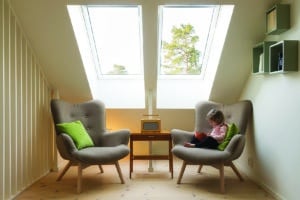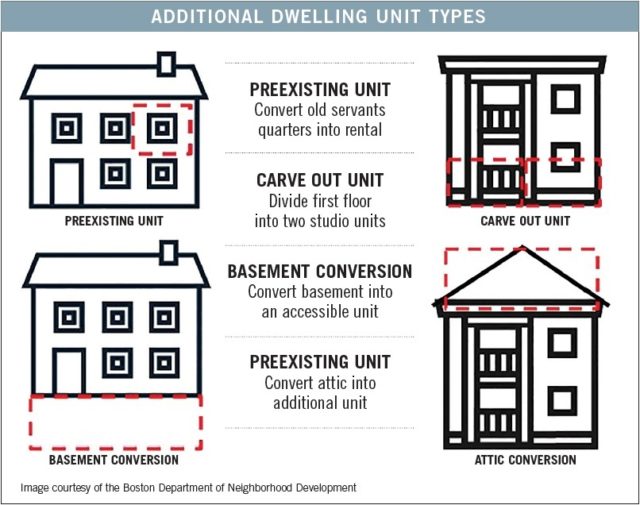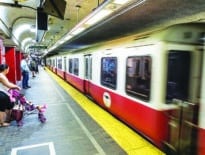
Creating small apartments in larger houses has proven more expensive than many Boston homeowners anticipated, with some cost estimates running between $80,000 and $100,000.
Some Boston-area communities are loosening the red tape that prevents homeowners from adding in–law-style apartments and small accessory dwellings, tapping into an overlooked housing affordability strategy.
The city of Boston earlier this year expanded a pilot program that allows owner-occupants to build so-called “additional dwelling units,” or ADUs, in one- to three-family homes. Some 62 of 74 applications have been approved by the Department of Neighborhood Development, with 14 projects under construction.
“There’s been a ton of interest in this program, which is evidenced by the number of applications we’ve received,” said Margo Cramer, adviser to the city’s chief of housing. “What we need to do now is simplify the application process, make more loans available and provide the online resources so people can understand what they’re getting into.”
The program does away with complex zoning requirements and allows ADUs to be built as-of-right if they stay within the footprint of the existing structure.
Even with the city’s offer of zero-interest loans up to $30,000 for ADU projects, however, only one project has tapped into the loan program so far. Households earning a maximum of 135 percent of the area median income are eligible to apply.
Conversions Cost $80K and More
Many homeowners put projects on the shelf after estimates for the work came in higher than expected, said Katie Marcial, assistant director of the Boston Home Center, which administers the loan program.
“Some of them thought $30,000 would be enough and when they realized it was going to cost a lot more than anticipated, they stepped back a while,” Marcial said.
Cost estimates for ADUs in three-family dwellings rose an average of 87 percent from the homeowner’s original budget as they moved through the permitting process and learned more about the requirements, according to a DND report on the pilot program. Final cost estimates topped $100,000 in three-family dwellings and $80,000 in two-family homes, the report said.

Units must include a kitchen, bathroom and two means of egress. ADUs in two- and three-family homes also require fire code upgrades such as sprinklers and hard-wired fire alarms.
The bulk of the projects involved basement conversions, which accounted for 89 percent of all applications during the pilot program.
The program was expanded in April to all Boston neighborhoods except the downtown and downtown waterfront zoning districts. That followed an 18-month pilot in East Boston, Jamaica Plain and Mattapan. The pilot received its strongest response with 34 applications in East Boston, which is experiencing rapid housing price and rent increases.
City Financing Offers Limited
Zero-interest loans of up to $30,000 are available to pay for the work, with no payments required until sale of the property or a cash-out refinancing. Households with incomes up to 120 percent of area median income can qualify for zero-matching loans, while those with incomes between 120 and 135 percent of AMI are required to match the city loan on a one-to-one basis.
The available loan pool totals $650,000 for the current fiscal year ending June 30, 2020, according to DND.
In addition to cost considerations, confusion about permitting may have discourage some homeowners from moving forward, city officials said.
During the pilot, homeowners were required to navigate a screening and preliminary design process before applying for building permits. The city has since eliminated the prescreening requirement, enabling residents to proceed directly to inspectional services. It’s also added an online toolkit with basic requirements, design guidelines and permitting tips. For those who require more information, a design committee including building and fire inspectors is hosting monthly workshops, ISD spokeswoman Lisa Timberlake said.
Somerville Considers Deed-Restricted Units
Only 37 of the 100 communities surrounding Boston allow construction and occupancy of accessory dwelling units, according to a 2018 report by the Pioneer Institute.

Steve Adams
Cambridge city councilors approved a new accessory apartments zoning ordinance in April. It allows single- and two-family dwellings that are at least 1,800 square feet to add one accessory apartment of up to 900 square feet, subject to special permit approval by the zoning board of appeals.
Somerville is considering new rules for accessory housing units as part of its comprehensive zoning review. The requirements would be more stringent than Boston’s program, with a deed restriction that the unit be rented to households earning a maximum of 110 percent of the area median income. Accessory units could be built within the home’s existing footprint or in a carriage house-style structure, subject to dimensional and setback requirements.
“We hear a lot of discussion about the importance of having more housing opportunities, and small renting opportunities, so we proposed a way to do it in the zoning overhaul,” said George Proakis, executive director of the office of strategic planning and community development.




 |
| 

